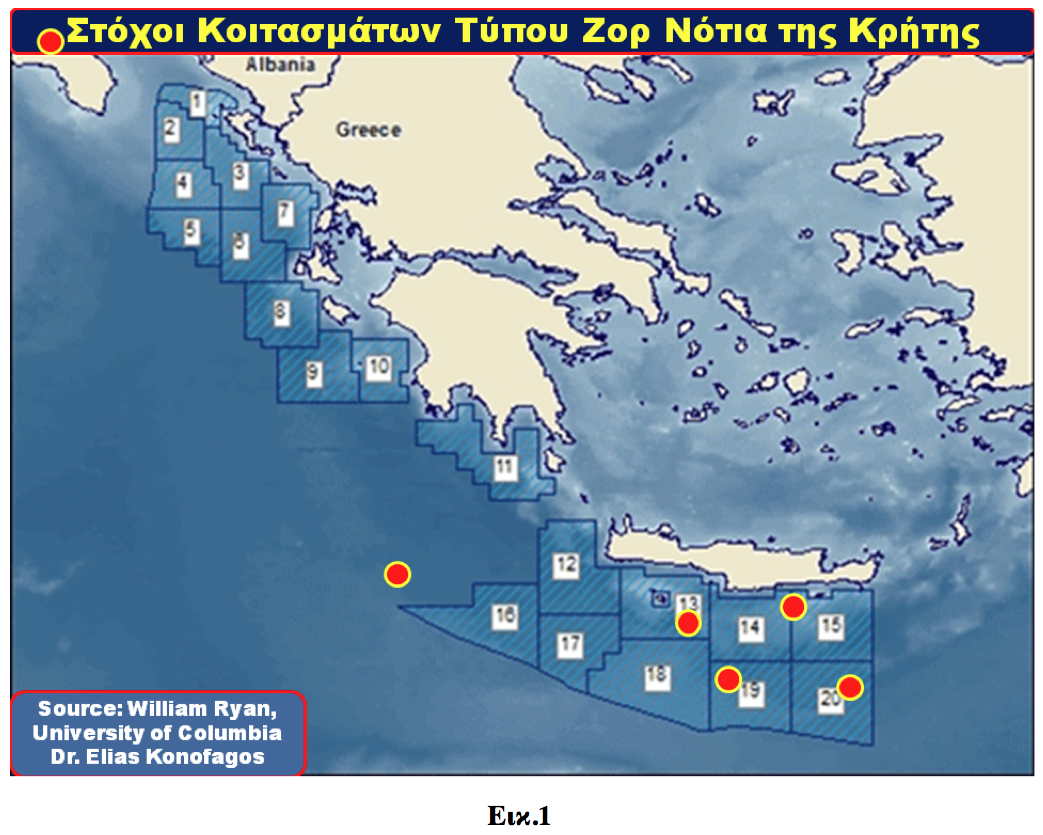25141 - EEZ: The Stone Age didn’t come to an end due to lack of stones
Ε. Conophagos, N. Lygeros, A. Foskolos
Translated from the Greek by Athena Kehagias
Six years have already gone by, since we’ve indicated to consecutive Greek governments, that they should confront, and dynamically overcome our impoverishment, resulting from the economic crisis, by highlighting the underwater mineral wealth of our Greek EEZ.
Recently we’ve repeatedly indicated to them, through our publications, that after the discovery of the Zohr hypergigantic natural gas reserve, new studies both at Columbia University, USA, and the Utrecht University in Netherlands indicate that geological possibilities exist, which allow for the prospect of similar natural gas reserves to be located south of Crete (Fig.1).
That fact aside, we are surprised in observing the immense indifference of those in government, who seem to know quite well, that as an authority it is much easier and much more socialistic to govern an impoverished Greek nation instead of a prosperous one.
Simultaneously, our political world lives and feeds on the hope that at some point of time the planet’s oil and natural gas will come to an end, and as a result the EEZ will be a completely useless tool for us all.
However, our historically ignorant governors are not aware, that even prehistory teaches us that the “Stone Age” didn’t come to an end due to lack of stones.(statement of Saudi Sheik Yamani 2000) which means that the natural gas era will not end due to lack of Natural Gas.
Whether we like it or not technology will continue to evolve and will constantly offer new solutions to our problems.
In order for us now to compare our absolute government developmental incompetence, we need to merely take a quick glance at the map of Egypt’s 75 “active” marine plots, where enormous research and production investments are already taking place (Fig.2).
Egypt announced that apart from the existing 75 plots, it’s expected to offer an additional 28 marine and onshore plots for research investments. .
On the contrary, Greece currently optains a single “active” marine plot in the Ionian Sea and that of course finds her completely satisfied.
It’s a known fact that we are in talks with Egypt and Cyprus, in regards to regulating bilateral and trilateral EEZ issues, as well as re: economic cooperational opportunities of a wider range.
We believe that our country should not continue to feed on its own flesh, collapsing in the Keadas of nothingness, but to create possible mineral wealth ASAP, for the benefit of the economy and for the benefit of its people.
That wealth can only emerge through investments aiming at the identification of possible, but extremely significant in size natural gas reserves, which could be located South of Crete, namely within the Mediterranean Ridge.
There, as we’ve previously mentioned, paleo-lagoon zones were identified through research from known universities and other researchers (see. Fig.1).
Of course the question always remains of when would the Greek government finally be awaken, and will become interested for the Southern Crete – even for research’s sake alone- as the Cypriot side has already done, in regards to most of the marine fields at her disposal.


